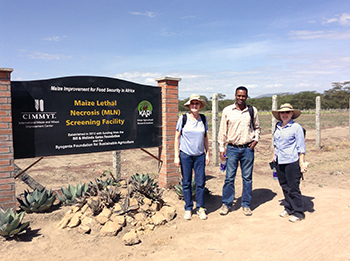Latest News Archive
Please select Category, Year, and then Month to display items
22 May 2020
|
Story Nitha Ramnath
![]()
A Virtual celebration of Africa Month
On 25 May 2020, Africa will celebrate the 57th anniversary of the founding of the Organisation of African Unity. A central tenet of the organisation, which was the predecessor of the African Union, is African solidarity. Member states undertook to coordinate and intensify their cooperation and efforts to achieve a better life for the people of Africa. The University of the Free State (UFS) has a long tradition of commemorating Africa Day and the ideas underpinning it. Every year, diverse events aimed at advancing African unity and solidarity take place during Africa Month – traditionally, the highlight is the Africa Day Memorial Lecture hosted by the University's Centre for Gender and Africa Studies.
This year, celebrating African unity through significant events involving the physical presence of a large number of people, will likely be impossible. COVID-19 is ravaging the world and Africa may become one of the world regions worst affected by the consequences of the virus. Social distancing may be difficult to achieve in a continent with densely populated urban centres that often feature large informal settlements. Besides, the economies of African nations are not as robust as those of other world regions. The challenge that Africa is facing, appears to be one that can only be mastered by its people acting in solidarity and unity. The continent has already developed an Africa Joint Continental Strategy for COVID-19 Outbreak to combat the virus, and an Africa Taskforce for Coronavirus has been established. The ideas of African togetherness and the underpinning philosophy of Ubuntu may be critical for strengthening African solidarity at a time when it may be more relevant than ever.
The commemoration of Africa Day takes a different theme each year. This year, the UFS 2020 Africa Month celebrations will take a virtual format, with the theme of ‘Africa together forever’ underpinned by the COVID-19 global pandemic. The theme is particularly significant considering the context of the African continent; and only through the demonstration of solidarity and unity can Africa overcome the challenges of the global pandemic.
The University will host a variety of cultural and intellectual contributions on the dedicated UFS virtual Africa Month website. On Africa Day (25 May 2020), a virtual Africa Day function, which will be posted on the website, will conclude the Africa Month commemorations.
The diverse contributions to the 2020 virtual Africa Month activities will highlight the University’s commitment towards creating a diverse, challenging intellectual environment. The UFS strives as a research-led university, to provide an environment in which new ideas are incubated and debated; contributing towards its transformation process and African unity.
Maize breeder rewarded for his research to enhance food security in Africa
2016-08-26

Prof Maryke Labuschagne from the UFS Department
of Plant Sciences, Berhanu Tadesse Ertiro, a
postgraduate student in Plant breeding at the UFS,
and Dr Peg Redinbaugh of the US Department of
Agriculture in Wooster, Ohio.
Photo: Supplied
Ethiopia is one of the African countries, deeply affected by food insecurity. Berhanu Tadesse Ertiro, a citizen from Ethiopia started his career - after graduating with his undergraduate degree in 2003 - as a junior maize breeder. Today he is pursuing his doctorate degree in Plant Breeding at the University of the Free State (UFS).
His research had made some great strides in contributing to food security in Africa. He recently received a fellowship from the prestigious Norman E. Borlaug Leadership Enhancement in Agriculture Program (Borlaug LEAP).
This fellowship is only awarded to students whose research has relevance to the national development of the student’s home country or region. The aim of these fellowships are to enhance the quality of thesis research of graduate students from developing countries who show strong promise as leaders in the field of agriculture and related disciplines.
Low soil fertility a major maize production constraint
Berhanu is also a visiting student at the International Maize and Wheat Improvement Center (CIMMYT) in Kenya, where he is running field experiments for his PhD thesis dissertation. His research focuses on Nitrogen Use Efficiency (NUE) and Maize Lethal Necrosis (MLN) disease tolerance. Low soil fertility and MLN are among the major maize production constraints in eastern and southern Africa, where maize is staple food.
Such hybrids have the potential to contribute greatly
towards food security among farmers and their
families through increased productivity.
The use of new tools could increase breeding efficiency and reduce the time needed for the release of new stress tolerant hybrids. Such hybrids have the potential to contribute greatly towards food security among farmers and their families through increased productivity. Berhanu is looking at the feasibility of genome wide selection for improvement of NUE in tropical maize.
Fellowship includes mentorship and supervision across borders
The programme supports engaging a mentor at a United States university and Consortium of International Agricultural Research Centers (CGIAR). During his fellowship, he will be supervised and mentored by Prof Maryke Labuschagne of the UFS, Prof Rex Bernando, a professor of Corn Breeding and Genetics at the University of Minnesota and Dr Biswanath Das of CIMMYT, Kenya.
As a LEAP fellow, Berhanu was invited to attend the 30th Annual World Food Prize events to take place in October 2016, in Des Moines, Iowa. The week will include his attendance at the Board for International Food and Agricultural Development meeting, participation at side-events at the Borlaug Dialogue International Symposium and the World Food Prize.